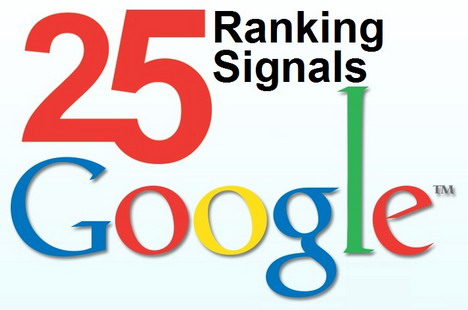25 Ranking Signals Google Use to Rank Websites in Search Results
Every year, Google makes hundreds of changes to its search algorithm with the aim of providing quality web pages to its users. The giant search engine also applies over 200 different signals to reward websites with quality contents by ranking them high in the search results. On the other side of the coin, Google penalizes low-quality websites by either lowering their search rankings or removing them off from the search results.
Last year Google has rolled out its major algorithm change called “Panda”. While the update has improved rankings for a large number of high-quality sites, it has also identified low-quality sites and upgraded their rankings. Early this year, another algorithm update named “Penguin” was released to penalize websites that employ webspam techniques such as keyword stuffing, cloaking and link schemes.
Google has been emphasizing many times on its blog and help forum that we should make sure our sites comply with its quality guidelines and develop more unique, original and quality contents rather than focusing on any algorithm tweaks. Having said that, if we can step into Google’s mindset to find out how it has been looking for high-quality websites. That will certainly save us a lot of time and efforts. Below we’ve compiled a list of ranking signals and guidance that might be used by Google to determine how websites rank in the search results. We hope you’ll find them useful.
If you know of any other ranking signals or if there’s any things you disagree with in this article, let us know in the comments below.
- How many authoritative, quality and relevant backlinks your site receives? Backlinks is one of the key factors determining your site’s ranking, you should develop more high-quality backlinks rather than getting high volume of poor backlinks.
- What is the Google PageRank (0 ~ 10) of your website? PageRank is one of the important metrics that can affect how your site is indexed and ranked.
- Does your website/page provide sufficient information, images, videos and other contents? You should do your best to publish original, high quality and informative content so that your visitors can get enough information without leaving your site to look for others.
- How well is your site optimized for SEO comparing to your niche’s competitors. It’s not advisable to either over-optimize or less-optimize your site as it will upgrade your site’s ranking in search results. Just make sure that your website is SEO-optimized enough to rank will do.
- Does your site have a good web design and user interface? A good user interface will make your content well-organized, easy to read and navigate. It helps to enhance the user experience.
- Amount of time or number of years your domain is live.
- Is your website considered an authority on your niche and topics?
- Has your website been consistently providing original, unique and quality articles/contents?
- Is your site’s content written by experts or people who knows the topics well?
- Does your site/page content have any spelling or factual errors?
- How good your keyword research is? Finding the right keywords and diversifying them in the content is the key to succeed in SEO.
- How anchor texts are used in your content? It’s always a good idea if you can use relevant keyword as the anchor text as a part of the SEO campaign.
- How fast your site/page loads? Slow loading pages may cause your website to rank further down in search results and will cause visitors to leave.
- Number of comments made by visitors. More informative and relevant comments made by visitors are some good signs that your site is an interactive community for sharing and discussions.
- Does your site have a diversified traffic sources such as direct traffic, search traffic, referral traffic as well as social media traffic.
- Does your site/page have duplicate or overlapping content?
- Number of direct visitors coming to your website for information. Direct visitor means people who arrives your site by typing your website address in the web browser’s navigation bar, through the bookmarks, etc.
- Number of visitors coming to your website through social networking sites like Facebook, Twitter and Google Plus. Is your website social media friendly? Does your site get a lot of social media attention?
- Number of pages per visit. On average, how many pages visitors view when they visit your site.
- Visit length. On average, how long your visitors stay on your site.
- Does your website have a good permalink structure? It’s important for Google crawling and indexing.
- Does your site/page have a proper heading structure? Make sure your headings are well-organized and you can incorporate keywords into them for on-page SEO purposes.
- Does your site have coding errors? It’s crucial to ensure that your site/page codes are validated so that search engine bots can quickly crawl and index your site content.
- Does your site/page have an excessive amount of ads that may distract visitors from the content?
- Is About or Contact details included in your site/page? This is important for Google to confirm that the site/page is created by real human rather than bots.
- Number of valid copyright removal notices Google receives for your website.
Tags: google, search algorithm, search engine, seo, tips & tricks, web development resources











































